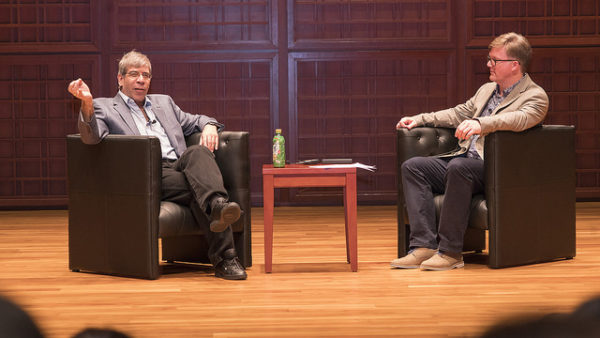Written by Nic Das, photos and video by Tatt Si
Professor Jerry Coyne took part in a dialogue regarding evolution, science and faith at Yale-NUS college. Dr Philip Johns from Yale-NUS moderated the dialogue, held on the evening of November 1, 2016. During the dialogue, Dr Coyne argued that the scientific method and religions are incompatible means of understanding the world. It is also difficult to separate science and religion into two neat categories answering different life questions because religious makes scientific statements. Dr Coyne also addressed several questions during the QnA segment.
Some points from the QnA segment
Dr Philip Johns said that while Dr Coyne prefers a world where everyone thinks rationally and looks at evidence, some people just prefer another type of world with supernatural reality. He wondered what will Dr Coyne say to them. In response, Dr Coyne said while it is okay to have a preference for prayer, it’s not likely to be heard. And if someone wants a certain outcome, he has to use the tools of science.
A member of the audience then argued that the “essential feature” of many religious beliefs is in its unverifiable nature. The religious believe that there are things that are true, reasonable and not empirical at the same time. Dr Coyne disagreed that unverifiable belief is an essential part of religion, pointing out how Christians would actually love to find evidence for the existence of God. As for unverifiable beliefs, Dr Coyne said they are largely made up and not a virtue.
However, Dr Coyne also acknowledged that certain things such as morality are unverifiable too. For example, Sam Harris’ assertion, that we should do what maximises the well-being of the world, is also unverifiable but it has some basis on which to act.

Dr Coyne argued that on one end, there are some Muslims who think that people who leave the faith should be killed. Many unverifiable statements stemming from religions have nothing to do with treating people well. On the other end, if your son says he’s hungry, you cannot prove that either. Thus, the atheist has to act on faith and give the child some food. Dr Coyne said that humans have evolved to take care of members of our species. Broader morality which has no objective or logical basis should be translated to something useful.
Another audience member then questioned how evolution can discount creationism when it doesn’t explain how life started. Dr Coyne argued that in a few years, there will be people able to reproduce life in conditions similar to the time when life originated. When this happens, the argument that God created the first living creature will be considerably weakened.
The same audience member then questioned how far has this process of creating life gotten, given that the closest the scientists have reached are “minor lapses” in the lab. In response, Dr Coyne said that scientists have come “quite far”, such as being able to produce amino acids from proteins. And while this is happening, creationists have found no evidence that God created life, creating an even more complex phenomenon of a divine being instead. They have also not answered theological questions of why God created all the species and caused 99% of them to become extinct.
Dr Coyne said that scientists still do not understand many things, such as dark matter and consciousness. Creationists often argue that science doesn’t have an answer, and therefore God is the answer. However, Dr Coyne pointed out that throughout history, many people who do not understand phenomena such as epilepsy and lightning and have also attributed them to God.
Dr Coyne gave a separate lecture at NUS on Oct 31. Watch it here: https://humanist.org.sg/jerrycoyne/




